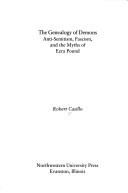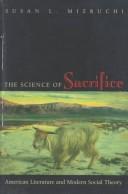| Listing 1 - 5 of 5 |
Sort by
|
Book
ISBN: 160917349X 9781628960754 1628960752 9781611860634 9781609173494 1611860636 Year: 2013 Publisher: East Lansing
Abstract | Keywords | Export | Availability | Bookmark
 Loading...
Loading...Choose an application
- Reference Manager
- EndNote
- RefWorks (Direct export to RefWorks)
Though its coinage can be traced back to a sixteenth-century translation of Leviticus, the term "scapegoat" has enjoyed a long and varied history of both scholarly and everyday uses. While WilliamTyndale employed it to describe one of two goats chosen by lot to escape the Day of Atonement sacrifices with its life, the expression was soon far more widely used to name victims of false accusation and unwarranted punishment. As such, the scapegoat figures prominently in contemporary theories of violence, from its elevation by Frazer to a ritual category in his ethnological opus The Golden Bough
Scapegoat in literature. --- English language --- Scapegoat (The English word) --- Religious aspects. --- Etymology. --- Etymology --- Word history --- History --- Germanic languages

ISBN: 0198182708 0191673870 Year: 1994 Publisher: Oxford : Clarendon Press,
Abstract | Keywords | Export | Availability | Bookmark
 Loading...
Loading...Choose an application
- Reference Manager
- EndNote
- RefWorks (Direct export to RefWorks)
English fiction --- Literature and society --- Realism in literature. --- Scapegoat in literature. --- History and criticism. --- History --- ROMAN ANGLAIS --- BOUC EMISSAIRE DANS LA LITTERATURE --- LITTERATURE ET SOCIETE --- REALISME DANS LA LITTERATURE --- 19E SIECLE --- HISTOIRE ET CRITIQUE --- GRANDE-BRETAGNE
Book
ISBN: 144268674X 9781442686748 9781442641242 144264124X 1442698888 Year: 2010 Publisher: Toronto, [Ontario] ; Buffalo, [New York] ; London, [England] : University of Toronto Press,
Abstract | Keywords | Export | Availability | Bookmark
 Loading...
Loading...Choose an application
- Reference Manager
- EndNote
- RefWorks (Direct export to RefWorks)
Using psychoanalysis as the primary model of textual analysis, Bluebeard Gothic focuses on the conjunction of religion, sacrifice, and scapegoating to provide an original interpretation of a canonical and frequently-studied text.
Religion in literature. --- Sacrifice in literature. --- Scapegoat in literature. --- Religion in drama --- Religion in poetry --- Brontë, Charlotte, --- Bluebeard --- Blue Beard --- Barbe-bleue --- Bluebeard (Legendary character) in literature. --- Jane Eyre (Brontë, Charlotte) --- Bluebeard (Legendary character)--in literature.

ISBN: 0810107104 0810107112 Year: 1988 Publisher: Evanston Northwestern university press
Abstract | Keywords | Export | Availability | Bookmark
 Loading...
Loading...Choose an application
- Reference Manager
- EndNote
- RefWorks (Direct export to RefWorks)
Antisemitism in literature --- Antisemitisme in de literatuur --- Antisémitisme dans la littérature --- Fascism in literature --- Fascisme dans la littérature --- Fascisme in de literatuur --- Myth in literature --- Mythe dans la littérature --- Mythe in de literatuur --- Right and left (Political science) in literature --- Scapegoat in literature --- Fascism and literature --- Literature and fascism --- Literature --- History --- Pound, Ezra, --- Pound, Ezra Loomis, --- Atheling, William, --- Bawnd, Izrā, --- Paount, Ezra, --- Pʻaundŭ, Ejŭra, --- Pavnd, Ezra, --- E. P. --- P., E. --- T. J. V., --- V., T. J., --- Pangde, --- Poet of Titchfield Street, --- Political and social views. --- Pound, Ezra Loomis --- Political and social views

ISBN: 0691015066 0691068925 1282753371 1400822475 9786612753374 1400812712 1400817196 1400805449 Year: 1998 Publisher: Princeton, N.J. Princeton University Press
Abstract | Keywords | Export | Availability | Bookmark
 Loading...
Loading...Choose an application
- Reference Manager
- EndNote
- RefWorks (Direct export to RefWorks)
From ritual killings to subtle acts of self-denial, the practice and rhetoric of sacrifice has a special centrality in modern American literature. In a compelling interdisciplinary investigation, Susan Mizruchi portrays an episode in American cultural history when the literary movement of realism and the fledgling field of sociology both converged in the belief that sacrifice is basic to sociality. This is a book about the fascination that sacrifice held for writers--principally Herman Melville, Henry James, and W.E.B. Du Bois--and also for those who articulated the main tenets of modern social theory, an inquiry that eventually spans historical events such as public lynchings and the political scapegoating of immigrants a century ago. The execution in Billy Budd Sailor, the death of Du Bois's first-born son in The Souls of Black Folk, Henry James's preoccupation with renunciation and scapegoating, and the self-denying working classes of Norris and Stein all illustrate repeated stagings of sacrificial rituals from a Biblical past. For Mizruchi, the peculiar persistence of this aesthetic construct becomes a guide to a rich theological and social-scientific tradition distinctive to the late nineteenth and early twentieth centuries, and including such influential works as Smith's Lectures on the Religion of the Semites, Frazer's Golden Bough, and Ross's Sin and Society. The major features of sacrifice--its original association with spiritual doubt, its function as a form of spiritual economics that sustained divisions between the fortunate and the bereft, and its role in fixing boundaries between aliens and kin--held strong symbolic value for writers struggling to reconcile faith with rationalism, and communal coherence with capitalist expansion. Mizruchi eloquently demonstrates how the conceptual power of sacrifice made it a key mediator of cultural change, from the decline of sympathy and the significance of "race" in an emerging multicultural society to the revival of maternal self-sacrifice.
American literature --- Human sacrifice in literature. --- Literature and anthropology --- Literature and society --- Realism in literature. --- Rites and ceremonies in literature. --- Sacrifice in literature. --- Scapegoat in literature. --- Self-sacrifice in literature. --- Social problems in literature. --- History and criticism. --- Abnégation dans la littérature --- Human sacrifice in literature --- James, Henry, 1843-1916. The Awkward Age --- Littérature réaliste --- Mensenoffer in de literatuur --- Neorealism (Literature) --- Neorealisme (Literatuur) --- Néoréalisme (Littérature) --- Offer in de literatuur --- Problèmes sociaux dans la littérature --- Realism (Literary movement) --- Realism in literature --- Realisme (Letterkundige beweging) --- Realisme (Literaire beweging) --- Realisme in de literatuur --- Realistische literatuur --- Rites and ceremonies in literature --- Rites et cérémonies dans la littérature --- Ritussen en ceremoniën in de literatuur --- Réalisme (Mouvement littéraire) --- Réalisme dans la littérature --- Sacrifice dans la littérature --- Sacrifice humain dans la littérature --- Sacrifice in literature --- Scapegoat in literature --- Self-sacrifice in literature --- Social problems in literature --- Sociale problemen in de literatuur --- Zelfopoffering in de literatuur --- Sociology of literature --- Thematology --- Anthropology and literature --- United States --- Du Bois, William Edward Burghardt --- Anthropology --- Magic realism (Literature) --- Mimesis in literature
| Listing 1 - 5 of 5 |
Sort by
|

 Search
Search Feedback
Feedback About UniCat
About UniCat  Help
Help News
News